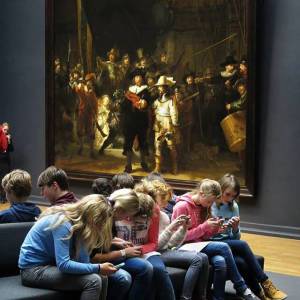available for purchase
at this time.
Link Roundup! – 4/18/15
Link Roundups feature articles and bits of internet goodness that our dramaturgy team digs up. If you find something you want to send our way, drop us a line on Facebook or Twitter!
♦♦♦♦♦
In the most recent post on Bitter Gertrude, Melissa Hillman examines the negative online reactions that the photo below received and how it highlights the importance of engaging with young audiences on their own terms:
We talk a lot about wanting to engage the rising generation in theatre, and I’m seeing a lot of “what can we do about this?” commentary on this picture. Listen: If you want to engage the rising generation, the first thing you need to do is stop lying to yourself about them. You’ll fail to engage them if you don’t approach them with honesty…This is exactly why 99.999% of “audience engagement strategies” fail miserably to bring in young, diverse audiences. This is why “tweet seats” failed. We’re not looking at this generation honestly. Instead we look at studies designed from the outset to confirm our hypotheses. We make assumptions about how the rising generation thinks and feels based on how they make us think and feel. We refuse to engage them on their own terms, instead dictating the terms to them and then blaming them for boorishness when they fail to meet them.
♦♦♦♦♦
Seth Lepore’s HowlRound essay about the importance of entrepreneurship and the blind many college theatre programs have about it has been getting lots of online buzz this week:
The blind spot of most college professors needs to be understood for what it is. A lot of college teachers who are tenure track have been in school their whole lives. Creating their own work has been in the context of academia and the relationship to both process and theory. Practitioners in the academy always have a place to rehearse and develop new work. They don’t have to worry whether people attend the performance and if it will break even or not. When showing a new work, they are part of an infrastructure that already subsidizes them. The business skill set doesn’t seem to fit into “What Would Artaud Do?” They are focused on students building a performance skill set. I’ve actually heard some of these well-meaning professors say “If they want that information, they can take a course with the business school.”
♦♦♦♦♦

Anu Productions’ 2014 site-specific immersive theatre piece Angel Meadow, in Ancoats, Manchester. Photograph: Graeme Cooper
This Guardian post about ditching the label “fringe” theatre is speaking about UK stages, but it’s a good question to consider in the US as well:
Ditching the label “fringe” would put all theatre-makers on an equal footing, wherever they work and in whatever form. It would stop the segmentation of audiences into those who do fringe and those who don’t. It would prevent grant-makers and funders from taking refuge in the labels, and saying “Well we don’t fund that kind of theatre, we only fund this kind of theatre”. And it would be a statement to the effect that, in these testing times, we are all in it together – and that means what resources are available have to be shared and available to all.
♦♦♦♦♦
Dance USA takes a look between the lines of the recent NEA report about arts audiences and their barriers to attendance:
I believe these barriers may be euphemisms — proxies for the tradeoff in value that people find in live attendance at the performing arts, as they consider other possible options on how to spend their time. After all, many non-attenders within the NEA’s demographics likely find time and money to throw holiday parties, plan weddings, attend sporting events, or watch movies. Yet time is a precious commodity. We must remember that we ask our audiences to invest a lot of their time and financial capital in attending dance performances. In 2007, Next Gen Consulting conducted a sizable study of arts audiences, and found that when considering the time that audiences dedicate to a paid arts and culture event or experience in its entirety, only about 35 percent of that time is spent enjoying the artistic experience itself. The majority of patrons’ time — a whopping 65 percent — is spent on “four other phases of the patron experience,” which Next Gen defines as information gathering, committing, arriving, and post-event (including post-show events, talking about the show, and traveling home). So on top of spending cash for tickets, two-thirds of audiences’ time and effort are expended before and after the few hours they are in the theater.
